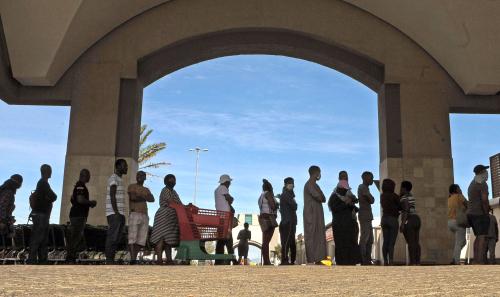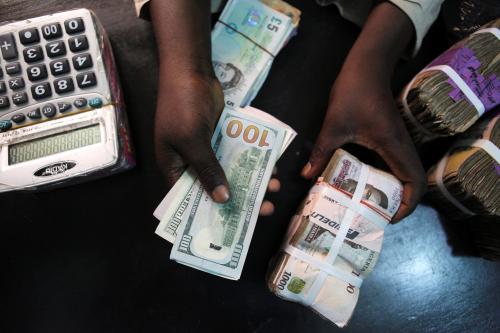Last week, the World Bank released its biannual Africa’s Pulse report, which discusses the macroeconomic outlook for sub-Saharan Africa. This edition focuses on the major challenges that COVID-19 presents to African economies. The report projects that, as a result of the pandemic, economic growth in sub-Saharan Africa will decline from 2.4 percent in 2019 to between -2.1 percent and -5.1 percent in 2020, depending on the success of measures taken to mitigate the pandemic’s effects. In other words, the report predicts that the region will experience its first recession in 25 years.
Figure 1 shows growth projections for the region in a scenario where the spread of the virus slows after an initial rapid spread, advanced economies lift containment measures after two months, and a variety of fiscal and monetary policies are enacted to lessen the economic effect of the pandemic. In this scenario, real GDP growth in sub-Saharan Africa is projected to decline to -2.1 percent in 2020 due to decreased economic activity in the region and disruption in the global economy, which will affect Africa’s participation in trade and value chains as well as reduce foreign financing flows. The decline will be primarily due to large contractions in South Africa, Nigeria, and Angola driven by their reliance on exports of commodities whose prices have already declined as well as other structural issues. Growth is projected to recover to positive levels by 2021, although it will remain below the levels of economic growth in 2018 and 2019.
Figure 1. Growth projections for sub-Saharan Africa, 2020 and 2021
Source: World Bank, Africa’s Pulse, April 2020.
The pandemic is also projected to widen fiscal deficits, particularly in commodity-exporting countries and countries dependent on tourism revenues. In the scenario described above, the revenue collected by sub-Saharan African governments is projected to be 12 percent lower than in a scenario without COVID-19. Because government spending will remain high in order to combat the effects of COVID-19, Africa’s overall fiscal balance is projected to deteriorate substantially, to around 2.7 percentage points of GDP higher than in a non-COVID-19 scenario.
African countries also face heightened public debt vulnerabilities: As Figure 2 shows, the ratio of general government gross debt-to-GDP in sub-Saharan Africa has gradually increased since 2012, rising from an average of 37 percent of GDP in 2012 to 59 percent of GDP in 2019. Even before the pandemic, many countries had resorted to more expensive sources of financing, such as sovereign bonds instead of concessional loans, due to liquidity problems stemming from the 2008-2009 global financial crisis and the 2011-2012 European debt crisis. These issues, combined with the deterioration in fiscal balances and the decline in economic activity in the region due to COVID-19, will make it more difficult for countries to repay their debt.
Figure 2. General government gross debt in sub-Saharan Africa, 2000-2019 (percent of GDP)
Source: World Bank, Africa’s Pulse, April 2020
As a result of these challenges, African governments will likely struggle to enact effective policies to fight COVID-19 while also preserving macroeconomic stability in the region. The report argues that financial assistance from multilateral organizations and official bilateral creditors—including temporary debt relief—will be needed to help Africa reduce the effects of the pandemic.
For a more detailed discussion on the interplay between African debt and the region’s ability to address the COVID-19 pandemic, see Africa needs debt relief to fight COVID-19.
For more on the general looming debt crisis in Africa, see the report Is sub-Saharan Africa facing another systemic sovereign debt crisis?







Commentary
Figures of the week: The macroeconomic impact of COVID-19 in Africa
April 16, 2020